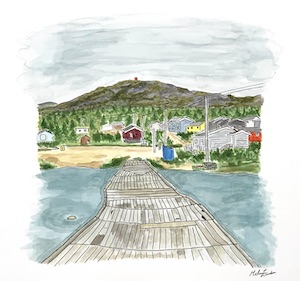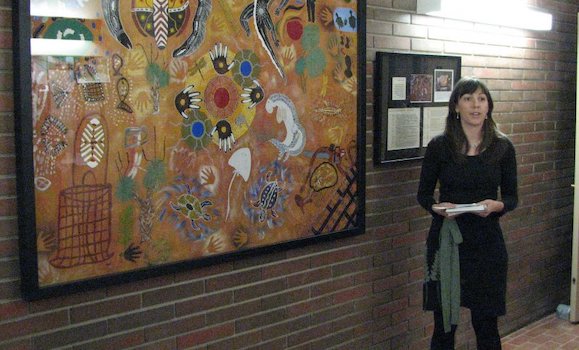Sciographies is a radio show and podcast about the people who make science happen, presented by The Faculty of Science and campus-community radio station CKDU 88.1 FM. This is the third article in series that features excerpts from each new episode released this fall.
Ìı
Melanie Zurba completed most of her education in Winnipeg, Manitoba until she signed up for a semester abroad in Coffs Harbour, Australia. That experience showcased the many dimensions of resource management and led her to discover a passion for community engagement and environmental governance.
Today Dr. Zurba is an Associate Professor in the School for Resource and Environmental Studies and the College of Sustainability.ÌıÌıexplores how to design studies that best support a community partnerâs aspirations. Dr. Zurba also taps into her creative side to use art as an engagement tool. Her work bridges the gaps between natural sciences, social sciences, the arts, and equity-deserving knowledge systems.
In this weekâs episode of Sciographies, host David Barclay sits down with Dr. Zurba to talk about doing âresearch about research,â leveraging the power of art, and what collaboration between researchers and Indigenous partners can look like.
Listen to a preview of Dr. Zurbaâs episode
Ìı·Ìı
Here are some excerpts from the episode, edited for clarity and length.
Finding a new path
Barclay:ÌıHow much of your experience being an urban Winnipegger has contributed to the type of research youâve done, and how early did that work start?
Zurba:ÌıSocial justice didnât really come into my trajectory until late in my undergraduate degree. I was very much in the traditional conservation paradigm for a long time. Thatâs why I enrolled in a biology degree focusing on wildlife conservation. But then it changed quickly, toward the end of my degree when I went to Australia [in a student exchange program].
Barclay:ÌıSo, you were finishing up your degree and you took this trip to Australia⦠Can you tell me a little more about your trip?
Zurba:ÌıIt was a new experience. I was taking courses in marine management instead of marine biology, so the perspective was different. I was learning about Indigenous perspectives, political issues, social issues â it was an awakening for me. That's where I really wanted to focus.
Exploring the grey area
Barclay:ÌıDo you consider yourself a scientist?
 Zurba:ÌıThat's such a good question. I have a hard time with -ists and -isms. If I had to answer in a job interview, I would say âyes,â because I do social science. But I feel like that's not always how I approach questions. Similarly, with the arts â Iâm into artmaking, but I don't call myself an artist⦠Science is a discipline, it has to be learned, and it's all about verification and validity. I completely respect it. It's one of the many hats that I wear. But I wouldnât say [being a scientist] is my only identity.Ìı
Zurba:ÌıThat's such a good question. I have a hard time with -ists and -isms. If I had to answer in a job interview, I would say âyes,â because I do social science. But I feel like that's not always how I approach questions. Similarly, with the arts â Iâm into artmaking, but I don't call myself an artist⦠Science is a discipline, it has to be learned, and it's all about verification and validity. I completely respect it. It's one of the many hats that I wear. But I wouldnât say [being a scientist] is my only identity.Ìı
Barclay:ÌıI guess when you bring people into the question, this idea that science can have the answer is not always correct.
Zurba:ÌıI don't often look for answers in my research, which I think is strange and maybe a little different. Maybe thatâs why I get invited to collaborate with people, because they like that as a unique approach. Itâs about further inquiry or understanding the grey zones that exist and bringing a bit of light to that. Sometimes I think when weâre looking for the answer, we miss a lot.
Committing to reconciliation
Barclay:ÌıOne of the things I find interesting is your timeline. I want to know how the larger movement of reconciliation has played into how you think about doing your research.
Zurba:ÌıThat's a really good question. When I was doing my PhD work [at the University of Manitoba], theÌıÌıwere being released and there was a lot of momentum around that, especially with Winnipeg being a hub with theÌıÌı(I was working with some of the folks there on an edited volume). But I always had these questions in the back of my mind: Is this enough? Is this the right process? Is it going to be enough to carry it forward? Because reconciliation doesn't stop â it's an ongoing process. It's something you must be committed to, and youâre constantly trying to be aware and self-reflexive.
Barclay:ÌıRelatedly, what role do you think the natural sciences should play in reconciliation?
Zurba: Questions and the way forward should come from communities, and folks in institutions should be willing to help. It can happen collaboratively, too. Maybe you have a relationship [with an Indigenous community] and you figure out questions together⦠Iâm really into service research. We have all these great resources: students, money, labs, infrastructure. If we can put ourselves in a position to help communities with that, then I think research is going in the right direction.
 Ìı
Ìı
Listen to the entire episode of Sciographies at 4:30 PM today onÌıÌıin Halifax or find it onÌı,Ìı,ÌıÌıand other popular podcasting platforms. You can also listen to previous Sciographies episodes on the same platforms or atÌıÌıandÌıdal.ca/sciographies.

